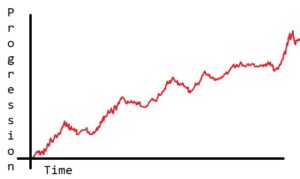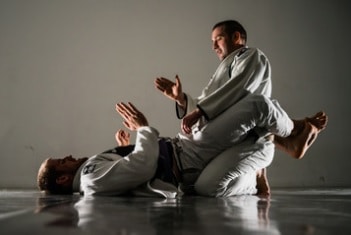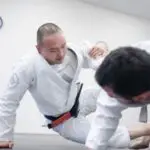Training Jiu-Jitsu is an exciting endeavor, especially in the first few months! Everything is fresh and your progression seems to be climbing at a steady rate. One moment you’re learning how to pass guard and survive, the next you’re submitting your opponents.
Suddenly, the progression seems to taper off and you feel as though you’re getting worse. The people that you could submit are now choking you and you’re finding yourself stuck in mount more often than you’d like.
Don’t worry! This is a normal sign of progression. Progression is not linear in any activity, so it definitely won’t be linear in Jiu-Jitsu! The progression looks more like a jagged line slowly moving up and down, plateauing at times, but eventually moving forward.

It’s important to remember this concept to avoid feeling discouraged and eventually quitting Jiu-Jitsu – or anything in life for that matter. I have 5 key points I want to highlight since not everyone progresses at the same rate! There are times that your progression will be quick and others where your teammates seem to excel past you.
- Newbie gains
- Your progression may be slower than others
- People learn at different rates
- Your teammates start surpassing you
- Don’t doubt your ability if your peers rank up faster
Newbie Gains
Progressing in Brazillian Jiu-Jitsu is not linear, much like training to get bigger muscles or stronger is not linear. Ever hear of newbie gains? Newbie gains are when someone starts training at the gym and gains 10-15lbs (5-7kg) of muscle in a few months! If these results were maintained for the entire year they would look like a professional bodybuilder in one year!
Long term this isn’t realistic or how the body works. Since the stimulus is new, your body is going to respond strongly to it – even if it’s not “optimal”. The more foreign an exercise is, the more strength and muscle you’ll rapidly gain as your nervous system learns how to efficiently perform the movement.
The same is true in Jiu-Jitsu. The only difference is you’re learning new concepts, techniques, and details to utilize on another person. When you first start Jiu-Jitsu you may not know how to maintain guard or a sweep, likewise, your partner may not know how to defend against them either. Learning one new sweep feels amazing as you’re able to land it against your opponent almost every time.
Eventually, your partner adapts or learns how to defend against your sweeps and attacks. It can take quite some time before a new technique works for you, while your partner grasps the new concepts quicker. Suddenly you’re the one that has to adapt to their attacks and learn how to defend.
Your Progression May Be Slower Than Others
The most important thing to recognize in Jiu-Jitsu to stay motivated is that progression is not the same for everyone. Learning a new technique may come quickly to one of your teammates while it may take months for you.
This has happened to me many times in my Jiu-Jitsu journey. My partner learns the new technique within minutes of being shown it and I struggle to even grasp how to move my hips to set it up!

The key is not to get discouraged or frustrated when this happens. Know that it isn’t because you’re stupid or that you’re not good enough for BJJ. Sometimes, like many other aspects of our lives, it can take us longer to learn certain concepts, while other concepts come easier to us.
Remember back in school? Maybe English or History class was a breeze for you, while Math made absolutely no sense! Maybe the Kimura is your English class and the Triangle Choke is your Math class. Instead of failing Math, throw the Triangle to bait a reaction to land your Kimura!
People Learn At Different Rates
Always remember that everyone progresses at different rates. In my first year of Jiu-Jitsu, I remember starting at the same time as another person and experiencing this first hand.
In the first few months, he was picking up on techniques quicker than I was. After three months he was better! I kept on my path of just focusing on techniques and slowly I began to notice that our rolls were becoming even again.
Six months in, I’d say we were equal; however, using different tactics and gameplans. Some nights he would get the better of me and others I would get the better of him! Something began to change though, I started to notice that I was able to get the advantage more often. And before I knew it, it was no longer even.
Nine months in my Jiu-Jitsu journey several new students joined! I was a two stripe white belt and was able to handle myself against these new, taller, heavier opponents.
Only a couple of months in, these newer students started to learn the fundamentals, and to me, they were picking up these fundamentals quicker than I did. It almost seemed as though one moment I was submitting them the next I was getting stuck in turtle getting strangled in a loop choke!
I didn’t let this discourage me though, I looked at it as an opportunity. They may be progressing quicker than I thought I did, but I can use the knowledge they’re learning to help me progress quicker too! Which could let me get the upper hand again that will lead them to improve and get the upper hand on me once again!
Your Teammates Start Surpassing You
Much like everyone learning at different rates, there are times that someone is just going to surpass you. This isn’t a reflection on you or your ability to learn.
Take a look at BJ Penn, he got his black belt in 5 years. Essentially unheard of and impossible for almost anyone! It doesn’t mean that everyone else who took longer to achieve the same should quit or feel bad about their abilities. Additionally, it doesn’t mean no one can beat him either. Many have and many have surpassed his skills as well.
The key is to focus on your abilities and concentrate on how to improve your technical abilities. Your friend or teammate may get their purple belt before you even get your blue belt, but that doesn’t mean you should quit and give up.
It’s your journey and path, everyone’s is different. Don’t get caught up in the ranking system or doubt your skills. Take the time to learn, practice, and retain the skills and knowledge required!
Don’t Doubt Your Ability If Your Peers Rank Up Faster
You may have been training Jiu-Jitsu for a few months and have been struggling to work towards your second strip. Someone new shows up and after 4 months they already got their second strip, before you!
It does not feel good. But know that it isn’t personal! Would you rather be a blue belt that a 2 stripe white belt could pick apart or be a blue belt that can help a 2 stripe white belt become 3 strips and threaten you with submissions?
It can be even more discouraging when you’ve gotten your third strip and someone new shows up only to lock up the new armbar from guard taught that class. The main thing is to leave your ego at the door and learn what went wrong to get you in that situation. We all make mistakes, but we can only get better when we try to learn from them, instead of beating ourselves up because of them.
Quote From John Danahar About Belt Ranks
I read a quote from John Danahar at bjjee.com about the belt rank. Anyone that is emphasizing their belt rank should read it. I think for most of us, especially in our first couple of years of jiu-Jitsu, getting obsessed with our belt rank is a real problem. Comparing our progression and rank to others can affect our mindset and truly discourage us from training.
Two things I have learned over the years in Jiu-Jitsu. First, Belts do absolutely nothing to enhance the one thing we should be interested in as we study Jiu-Jitsu – our performance level (we should always be striving to improve our own performance and the performance of those around us and ultimately the performance of the art itself).
Second, despite this, people probably put more obsession and concern into belt color than they do into anything else in the sport. In truth, there is only one belt that counts – black belt. Understand that if you study for a lifetime you will spend the vast majority of your training years as a black belt and look back and wonder why you ever concerned yourself with worry over how long it took to go from blue to purple belt.
Once you become an adult no one cares what grades you scored in junior high school – though when you were back in junior high school they probably seemed like a big deal to you. As an adult, people only care about your achievements as an adult. So too with belts. Black belt denotes your passage into training adulthood – nothing more. It is a symbol that you can now enter into a more serious phase of learning where you know enough to formulate your own developing approach to the game and begin to teach others. You still have a lifetime of learning and development ahead of you.
John Danahar
Conclusion
Progression is not linear for any activity in life, Jiu-Jitsu is no different. There is going to be a lot of new information presented to you in Jiu-Jitsu when you begin. Implementing, remembering, and practicing these techniques are going to be awkward at first and time to learn (and many years to master).
It’s important to know that your progression will not be the same as others in your Jiu-Jitsu class. There will be times that you’ll understand a technique quicker than someone and other times that your teammate will understand it quicker than you.
Furthermore, you will get to know people who just keep getting better to a level that you’re unable to keep up with. It might not even matter that they started 6 months or even 2 years after you!
Progress at your rate and do not let the success of others discourage your success. Remember that progression is not linear either. There are going to be times that you feel as though you’re getting worse. Stick with it, ask questions, try new concepts or approaches to rolling and you’ll make it through the plateau!

